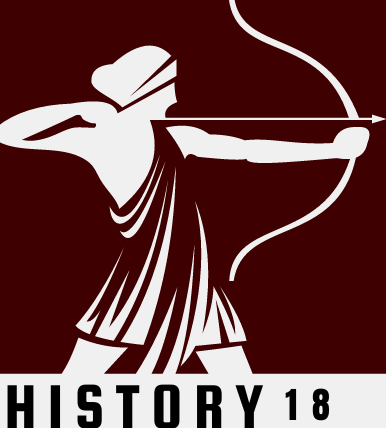Zeus is one of the most important and well-known figures in Greek Mythology. As the ruler of Mount Olympus and the king of the gods, Zeus held a position of utmost importance. Despite being revered as the ultimate father figure and the leader of all deities, a considerable number of the fellow Olympians were, in fact, Zeus’s siblings, each governing their distinct domains.
Through his triumph over the Titans, Zeus brought an end to the wars of succession in Greek myth, conclusively breaking the cycle of celestial conflicts for control of the throne. This victory solidified his position as the eternal sovereign of the cosmos, ensuring his enduring rule.
How Many Siblings Did Zeus Have?
Zeus has a total of six siblings, five of whom are his full brothers and sisters, while the sixth Chiron is his half-sibling. The three sisters of Zeus are Hestia, Demeter and Hera. His two brothers were Hades and Poseidon.
How Were Zeus and His Siblings Born?
The tale of the birth of Zeus and his siblings unfolds within the Greek Myth of Zeus and Cronus. This narrative illuminates how Zeus, through his cunning, liberated his siblings and wrested control of the cosmos from Cronus and the Titans.
Cronus’s relationship with his own progeny was strained, stemming from a prophecy shared by his parents, Gaia and Uranus, foretelling his eventual downfall at the hands of one of his own offspring. In response, Cronus adopted drastic measures, swallowing each of his children whole to thwart their potential rebellion.
However, when Zeus was born, his mother Rhea cunningly swapped Zeus with a swap wrapped in baby clothes, shielding him from Cronus’s grasp. Rhea entrusted Zeus to the care of Cynosura, a sea nymph. As Zeus matured, he masterminded the eventual freedom of his siblings by creating a beverage of mead infused with a potent drug.
Cronus drank the mead, causing him to regurgitate all that he had ingested, including Zeus’s brothers and sisters. This made Zeus, both the youngest and eldest child of Cronus and Rhea in a weird paradox.
Hestia

Hestia, the firstborn of Cronus and Rhea, assumes the role of the goddess of the hearth, family, home, and state. Her being the first Olympian god to be born affords her the privilege of receiving the inaugural offering in each household sacrifice to the Greek deities. Subsequently, Zeus bestowed upon her the honor of overseeing all gifts.
In her divine existence, Hestia refrained from bearing children. This commitment to eternal virginity was established shortly after both Apollo and Poseidon vied for her affections. Despite her lack of motherhood, numerous depictions present her in a maternal light, illustrating her embodiment of domestic life.
Often portrayed tending to a hearth, Hestia sanctuaries and temples frequently featured an unending flame symbolizing her profound connection to fire. Allowing this flame to extinguish was a grave dereliction of duty.
The responsibility of upholding Hestia’s cult mainly fell to the women of the household. While a significant goddess, she assumes a less active role compared to her more dynamic siblings. While her brothers and sisters engaged in the affairs of mortals and heroes, Hestia dedicated herself to the preservation of hearths and homes. Her serene presence and commitment to the foundational aspects of life ensured the stability and continuity of Greek households and communities.
Demeter
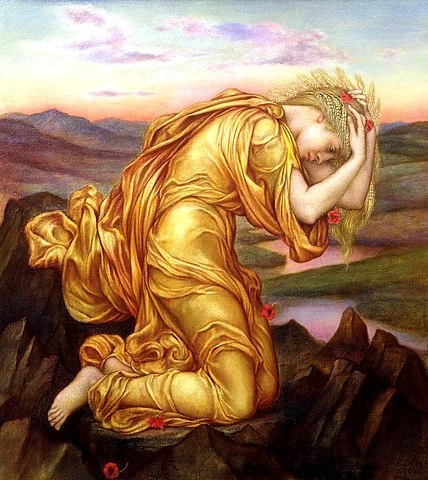
Demeter, the second sister of Zeus is the Olympian goddess of harvest and agriculture. Revered for her influence on grains and the overall fertility of the soil, Demeter’s presence ensured bountiful harvests and the sustenance of ancient Greek communities. This goddess also extended her dominion over sacred law and the cycle of life and death, earning her the title of Thesmorphos, the “bringer of divine law.”
Beyond her role as a sister to Zeus, Demeter’s personal history is entwined with the myth of Hades and Persephone. She was not only a sibling but also a former consort to Zeus. Their brief liaison resulted in the birth of Persephone, a name forever etched in Greek mythology.
The mythology of Demeter and Persephone explains the ebb and flow of the seasons. During the time Persephone resides with Demeter, flora flourishes, and the soil yields its treasures. As she journeys to the Underworld for the winter, the earth turns barren and lifeless. This timeless tale captures the essence of nature’s cyclical rhythm and the eternal connection between the goddesses and the land they nurture.
Hera
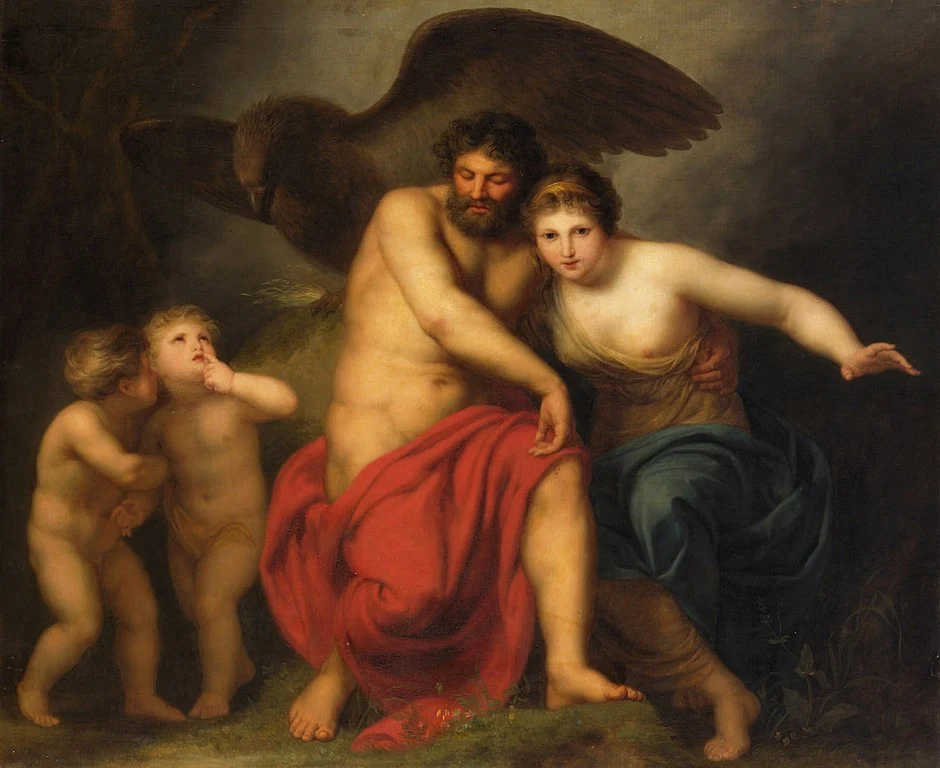
Hera, the final sister among Zeus’ siblings is the Olympian deity embodying women, marriage, childbirth, and family. She is not just Zeus’s sister, but also claims the title of Zeus’ wife, making her the reigning Queen of Mount Olympus. Often depicted in regal form, she’s encircled by sacred animals like cows, peacocks, and lions.
Hera’s marital bond with Zeus bore several children, including renowned deities like Ares, the god of war; Eileithyia, the goddess of childbirth; Hephaestus, the blacksmith god; and Hebe, the goddess of eternal youth. Additionally, the Charities also sprang from her divine lineage.
Greek mythology is filled with stories of Hera’s struggles with jealousy, a recurrent theme often centering on her husband’s infidelity. Notably, she transformed Io into a cow due to her husband’s transgressions.
While Hera herself remained steadfast in fidelity, Zeus’ numerous consorts bore him countless children, driving Hera to seek vengeance. Her wrath particularly targeted figures like Leto, the mother of the twin gods Apollo and Artemis.
Hera’s complex character weaves through tales of loyalty, rivalry, and maternal instincts, painting her as both a formidable goddess and a figure grappling with the challenges of her divine marriage.
Hades
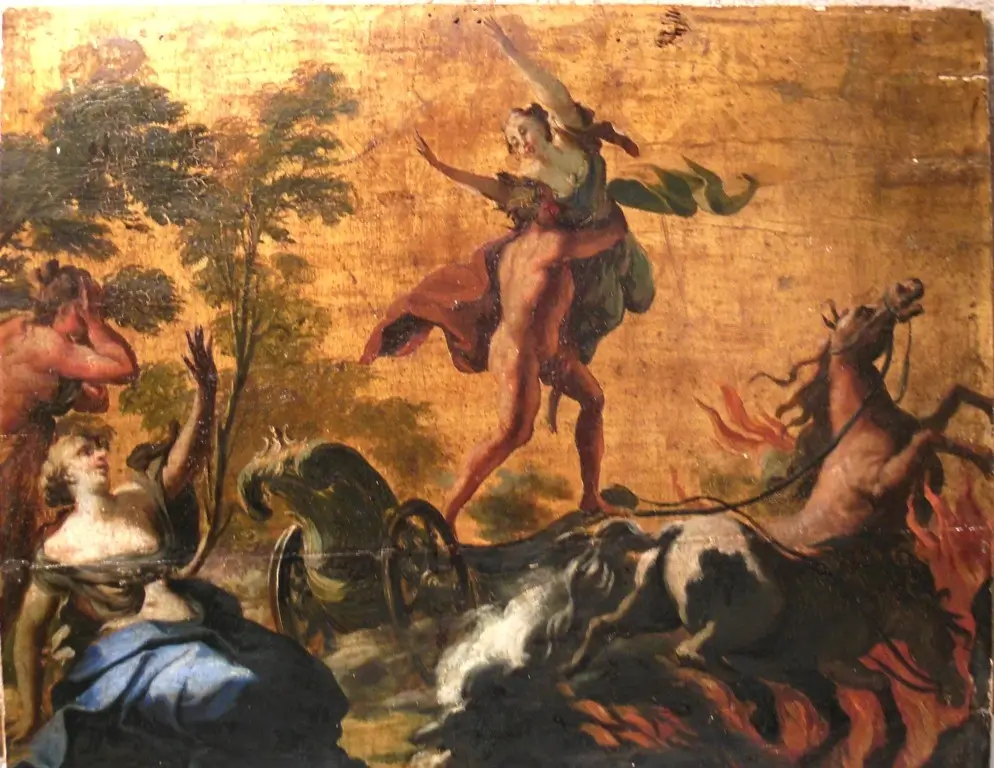
Hades, the eldest brother of Zeus, holds dominion over the Underworld, a realm linked to his name. Born to Cronus and Rhea, Hades was the last of the Olympian siblings disgorged by Cronus after the Titanomachy.
Following the war with the Titans, Zeus, and his brothers faced the task of allocating their respective domains. Zeus claimed the sky, Poseidon the ocean, and Hades assumed rulership over the Underworld. This realm became inseparable from his identity. Hades adeptly embraced his role, dedicating his time to governing the departed souls under his jurisdiction.
In ancient Greece, he evoked widespread fear, and his name was often left unspoken. Hades seemingly relished in this fear, though he himself was portrayed as passive, maintaining a delicate equilibrium. While depicted as cold and stern, he enforced his laws impartially among his subjects.
Many stories involving Hades revolved around others’ attempts to manipulate the Underworld’s rules for their benefit. Hades opposed endeavors to elude death or journeys back to the realm of the living.
Hades spent his days in his Underworld palace, alongside his wife Persephone, whom he had previously abducted. Through cunning manipulation, he bound her to him by compelling her to consume pomegranate seeds, thus forever intertwining their fates according to the associated myth.
Poseidon
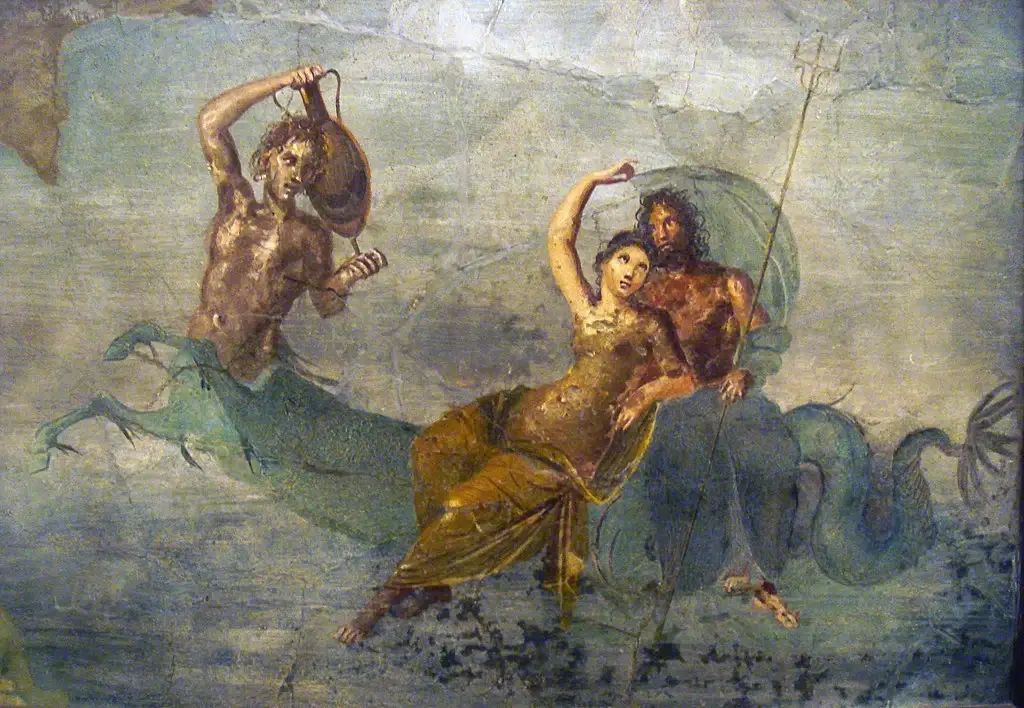
Poseidon was the fifth offspring of Cronus and Rhea. He is the Olympian deity who rules over and governs the seas, storms, earthquakes, and horses. Revered as the principal god in the Greek cities of Pylos and Thebes, Poseidon’s standing among the Olympians is paramount, yet his reputation isn’t without its destructive aspects.
Poseidon’s mood mirrors the condition of his domain; thus, his temperament could range from benevolent to fierce. Mariners, in particular, bore the brunt of his wrath. Often wielding his formidable Triden, he could convulse the earth and unleash thunderous storms, capable of swiftly capsizing ships.
Notably, Poseidon’s interventions impacted significant narratives, such as delaying Odysseus’ journey in the Odyssey. The myth Poseidon and Athena tells about a competition between them to become the chief deity of Athens. Athena triumphed over Poseidon and became the patron goddess of Athens.
Poseidon tried to appease the city by creating a spring using his trident, but Athens opted for Athena’s gift of the olive tree. In response, Poseidon unleashed a catastrophic flood to chastise the Athenians.
Despite his marital ties to the Nereid goddess Amphitrite, Poseidon, akin to his brother Zeus, engaged in numerous affairs with both goddesses and mortal women. This resulted in the siring of renowned Greek heroes like Theseus, Orion, Pegasus, and Bellerophon.
Chiron – The Half Brother of Zeus
Chiron stands apart from his fellow siblings of Zeus, for he isn’t counted among the Olympian gods. He is a Centaur and a half-sibling to the first Olympians. His parentage connects him uniquely to Cronus as his father and the Oceanid nymph Philyra as his mother, rendering him a half-brother to Zeus.
Notably, Chiron defies the common reputation of centaurs, which typically depicted them as wild, indulgent revelers and often uncivilized troublemakers. Unlike these stereotypes, Chiron emerges as a wise and civilized centaur, owing much to his lineage and upbringing. Raised not by his birth parents but by Apollo, Chiron acquired a wide range of skills from medicine to archery and even music.
Chiron instructed prominent figures in Greek mythology serving as a teacher. Some of his most prominent students included Asclepius, Aristaeus, Actaeon, Achilles, Jason, and Medus, who was the half-brother of Theseus. Chiron’s influence extends to significant myths, including the Argonauts’ tale, in which he hospitably received them during their voyage.
Tragically, Chiron met his end through an accidental injury inflicted by Hercules’ poisoned arrows. Intriguingly, Chiron had willingly relinquished his immortality for the freedom of Prometheus, as he believed Prometheus’ act of gifting fire to humans was righteous. Following his demise, Chiron’s legacy was immortalized as the constellation Centaurus among the stars.
Also Read: The Children of Hades: Did Hades Have Children in Greek Myth
